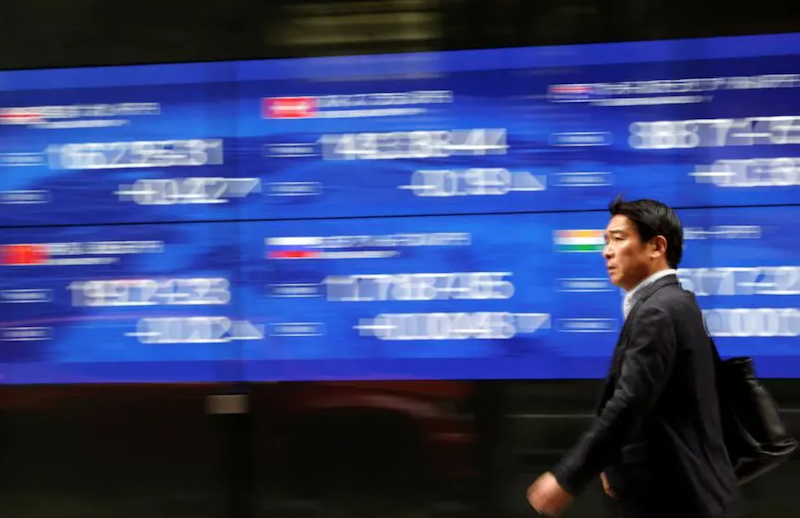Asian stocks hit 27-month highs on Thursday after soft US data and dovish Federal Reserve comments on inflation increased the chance of a rate cut by the US central bank in September. That boosted bonds and commodities, but weighed on the US dollar.
MSCI’s broadest index of Asia-Pacific shares outside Japan rose 0.9% to its highest since April 2022, while the Nikkei in Japan was up 0.9%, close to its peak in March, and the broader Topix hit all-time highs.
Stocks in Hong Kong gained 0.3% at close of trading on Thursday – its fourth straight rise this week, while Taiwan’s main index also struck a record led by the tech sector and chip giant Taiwan Semiconductor Manufacturing Co (TSMC), which cleared T$1,000 for the first time.
ALSO SEE: China’s BYD Opens Its First EV Plant in Southeast Asia
In Hong Kong, leading Chinese carmakers such as BYD and Li Auto rallied by 1.9% and 3.9% respectively, as EU countries showed signs of wavering on imposing tariffs on Chinese electric vehicles.
Search engine operator Baidu was up 1.3% to HK$87.30, while e-commerce giant Alibaba rose by the same amount to HK$73.15. In Shanghai, the Composite Index slipped by 0.8%.
In India, benchmark indices the Nifty and Sensex shed most gains to end marginally higher after a day of choppy trading. Sectors such as IT, health, pharma and auto were did best.
The Sensex was up 0.08% at 80,050 and the Nifty was up 0.06% at 24,302. Analysts said a rally in IT stocks along with supportive global cues, plus hopes of a positive budget kept the index in the green.
Trading across the global was generally thin, though, with a holiday in the United States later today, and investors waiting to see how large a majority the Labour Party may get in the UK election.
Markets are well prepared for a change given opinion polls have for months put the centre-left party on course for a landslide victory over the Conservatives, plus its has relatively modest tax and spending plans, analysts said.
Markets may also have been lifted by polls suggesting the National Rally would not win a majority of seats in Sunday’s French election, as mainstream parties moved to block the far right.
S&P 500 futures and Nasdaq futures were steady after reaching another record overnight in the wake of soft economic data.
The US ISM measure of services activity surprised by sliding to its lowest since mid-2020, with employment notably weak ahead of the June payrolls report due on Friday.
Analysts cautioned that this was contradicted by strength in the PMI survey of services, but did note that price measures in both surveys pointed to easing inflation.
Subdued US data
A run of subdued data mean Citi’s US economic surprise index has sunk to -47.5, the lowest since August 2022. Meanwhile, the closely watched Atlanta Fed’s GDPNow estimate fell to just 1.5% from 1.7%.
That should be music to the ears of the Federal Reserve, with minutes of its last meeting showing committee members wanted more evidence of a cooling economy before cutting rates.
At the time of that meeting, the GDPNow growth estimate was running around 3% annualised.
“Reading through the minutes from only three weeks ago, it is a good reminder of how quickly the activity outlook has deteriorated,” Paul Ashworth, chief North America economist at Capital Economics, said.
“Given the more encouraging personal consumption expenditure data in May, the risk of a reacceleration in inflation seems even less likely, particularly with GDP growth now running well below its potential,” he added. “We still think that the Fed will begin to cut interest rates this September.”
Markets quickly lifted the probability of a September rate cut to 74%, from 65%, while pricing in 47 basis points of easing for this year.
Yields on 10-year Treasuries dropped 8 basis points in response to 4.355%.
USD drops, Euro and Aussie up
With the US economy now seemingly less exceptional, the dollar dropped across the board. The euro was up at $1.0785, and away from its recent low of $1.0666, while the dollar index hit its lowest in three weeks.
The Australian dollar was a notable gainer, touching a six-month peak of $0.6733 as markets are wagering the next move in local rates could be higher.
The yen remained out in the cold, hitting multi-year lows on a host of currencies as investors continued to favour carry trades. The dollar stood at 161.53 yen after striking a 38-year top of 161.96 overnight.
The drop in the dollar was a boon for commodities, with gold rallying to $2,358 an ounce, from $2,318 at the start of the week.
Oil prices eased a touch, having gained overnight when a surprisingly large decline in US crude stocks pointed to firmer demand as the US driving season gets underway.
Brent dipped 47 cents to $86.87 a barrel, while US crude fell 53 cents to $83.35 per barrel.
- Reuters with additional input and editing by Jim Pollard
ALSO SEE:
China’s Services Confidence at 4-Year Low, Survey Shows
Germany Opposes EU Tariffs on China EVs, as Trade Heat Rises
Indonesia’s First EV Battery Plant Launched by Hyundai, LGES
Chinese Firms See Morocco as Path to US EV Credits – AP
Toyota to Launch EV With Tesla-Like Driving System in China
India’s Surging Economy at Risk From Severe Water Shortages
























